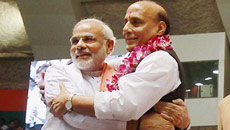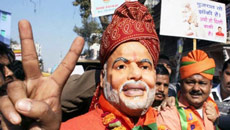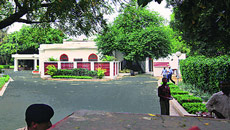History will be kinder to me, Prime Minister Manmohan Singh stated at his final press conference earlier this year. As he ends his decade-long tenure as head of two successive UPA governments, his stock as a middle class hero stood severely diminished due to a floundering economy, shrinking opportunities and the acts of omission and commission of colleagues in the government and party.
Yet, Prime Minister Manmohan Singh stands out in eyes of those who worked with him and knew him closely as a visionary and statesman who pushed through policy moves that he felt were critical for the country in the long run, had a strategic conception of a rising India's place in the world while also keeping the shaky UPA boat afloat till the end, swallowing his own pride many a time in the process.
He exhibited rare daring and passion at least twice in his public life -- once when as finance minister he sculpted India's economic reforms in 1991 in the face of a balance of payments crisis, and then, at the fag end of UPA-I, when as prime minister he determinedly pushed through the landmark India-US nuclear deal.
A key proponent of inclusive growth, whose economic ideology of combining development with social equity was shaped by his teachers at Cambridge, Manmohan Singh -- who also studied at Oxford and taught at the Delhi School of Economics -- piloted the key welfare initiative in the shape of the rural employment guarantee scheme.

The scheme that guaranteed a member of every rural poor household 100 days' employment in local infrastructure and development projects was a hit and helped the prime minister win a second term with 200-plus seats.
But, according to his former media advisor Sanjaya Baru, the credit for the scheme was hijacked by the Congress party, which sought to showcase it as the achievement of Congress vice president Rahul Gandhi.
Baru says an attempt by him to play it up as the prime minister's birthday gift to the nation on Sep 26, 2007, fetched him an admonition from Manmohan Singh. "Let them take all the credit. I don't need it. I am only doing my work," he said, Baru recounts in his book "The Accidental Prime Minister: The Making and Unmaking of Manmohan Singh".
That line reveals Manmohan Singh's keenness to always remain in the shadows, behind party president Sonia Gandhi, never striving to project himself more than her or the Gandhi family. After all, the family appointed him prime minister in the first place over many other aspirants.

"Dr Singh had a powerful story to tell about his achievements as prime minister, but he invariably shied away from telling it...'I want my work to speak for me'," Baru quotes him as saying in his book.
B.K. Chaturvedi, who was cabinet secretary from 2004 to June 2007 and worked closely with Manmohan Singh, says that the "enormous respect which the global community, including China, USA, Russia and other major powers gave to India was due to his personality and enormous depth of knowledge of economic issues".
"His quiet handling of the 2006 tsunami and other major disasters, his humility and enormous courtesy to his colleagues, coupled with depth of knowledge and his continuous emphasis on introducing reforms. He is a prime minister with great vision for India," Chaturvedi told IANS.
After the 2009 mandate, with the obstructive Left parties out of government, things should have looked up for the prime minister in the second term. Instead they deteriorated.
The chipping away at the position of the prime minister by the other centre of power that existed, Congress president Sonia Gandhi who wielded the upper hand, led to the unravelling of UPA-II, according to many.

"Thereafter, he seemed to be giving up. He lost his drive and he became completely non-confrontational and was unwilling to intercede in ministerial and official disputes," the adviser told IANS, not wishing to be identified.
In his latest blog, BJP leader Arun Jaitley sums up Manmohan Singh's position: "...He was literally a Prime Minister announced by Sonia ji. He had to function within that limitation."
He adds: "...He never wanted to rock the boat. He knew that he was vested with limited power and on all major decisions he had to keep the party and its first family in good humour."
On the opposition charges that the PM was "weak", and that this led to a "dual power center", Narayanasamy said it was "wrong criticism".

"It is on the basis of the party's policy that the government came to power. The party matters and it cannot be ignored. The party's ideology drives the government and both are interlinked," the minister told IANS.
According to Baru, Congress vice president Rahul Gandhi's outburst last year when he publicly trashed an ordinance to save convicted legislators from disqualification as "complete nonsense", was part of a larger plan to replace the prime minister and anoint Rahul Gandhi. Baru had publicly said then that the prime minister should quit after the insulting remarks.
Former cabinet secretary T.S.R. Subramaniam, who held the post during 1996-1998, feels Manmohan Singh was "a good man" and was "chosen specifically to play second fiddle". "My own judgment is that he was not cut out for that job. Leadership's job is to take decisions. The prime minister is not supposed to be number two. I think it (the post) was too big for him," Subramaniam told IANS.

"It is also important that the top man leaves the post in a better condition. He (Manmohan Singh) has diminished that office. The next prime minister will have to bring it back to its original (stature) and it is a difficult (task)."





